Comprehensive Analysis: Marijuana Legalization's Impact on Canada
VerifiedAdded on 2023/04/07
|8
|1136
|242
Report
AI Summary
This report provides a detailed analysis of the legalization of marijuana in Canada, examining its economic and public health impacts. The introduction highlights the historical context and objectives of the Cannabis Act (C-45). The economic section explores the tax revenue generation, job creation, and potential disadvantages such as reduced employment and government spending. The public health section discusses therapeutic advantages, risks of addiction, and the correlation between marijuana use and various health issues, including motor vehicle accidents and mental health concerns. The report concludes that while marijuana legalization offers economic benefits, it also presents significant public health challenges, emphasizing the need for appropriate methodologies to mitigate the negative impacts. A questionnaire is included to gather opinions on marijuana use and legalization.
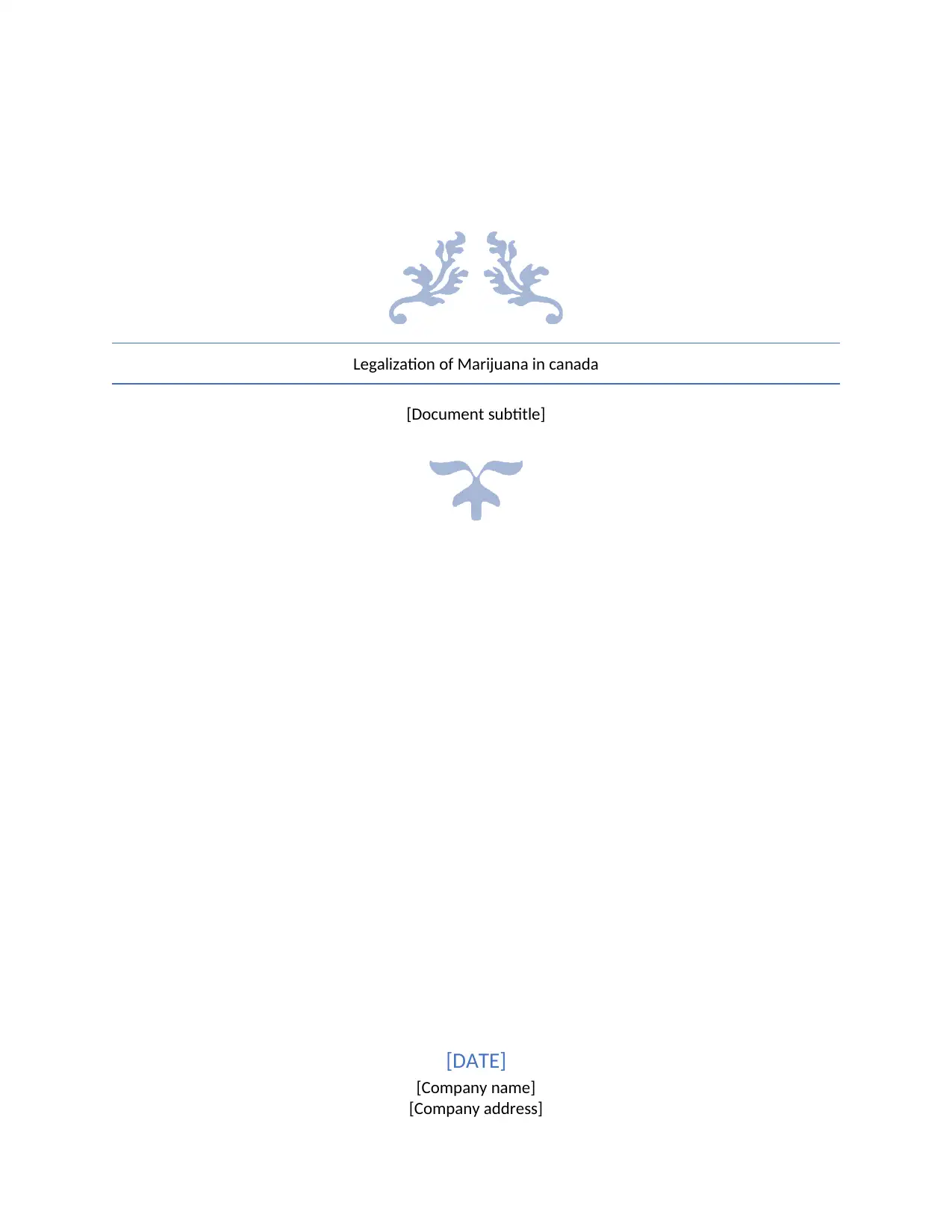
Legalization of Marijuana in canada
[Document subtitle]
[DATE]
[Company name]
[Company address]
[Document subtitle]
[DATE]
[Company name]
[Company address]
Paraphrase This Document
Need a fresh take? Get an instant paraphrase of this document with our AI Paraphraser
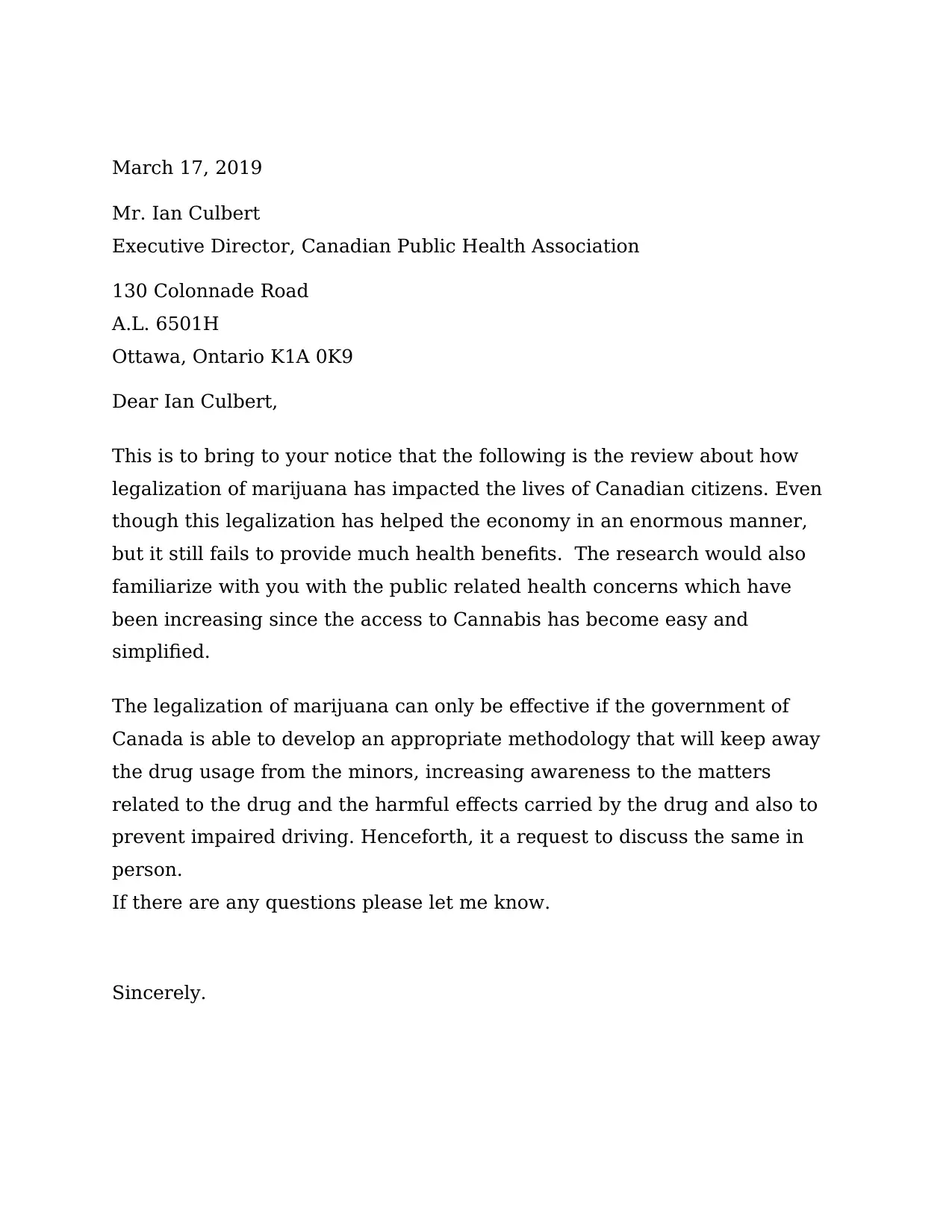
March 17, 2019
Mr. Ian Culbert
Executive Director, Canadian Public Health Association
130 Colonnade Road
A.L. 6501H
Ottawa, Ontario K1A 0K9
Dear Ian Culbert,
This is to bring to your notice that the following is the review about how
legalization of marijuana has impacted the lives of Canadian citizens. Even
though this legalization has helped the economy in an enormous manner,
but it still fails to provide much health benefits. The research would also
familiarize with you with the public related health concerns which have
been increasing since the access to Cannabis has become easy and
simplified.
The legalization of marijuana can only be effective if the government of
Canada is able to develop an appropriate methodology that will keep away
the drug usage from the minors, increasing awareness to the matters
related to the drug and the harmful effects carried by the drug and also to
prevent impaired driving. Henceforth, it a request to discuss the same in
person.
If there are any questions please let me know.
Sincerely.
Mr. Ian Culbert
Executive Director, Canadian Public Health Association
130 Colonnade Road
A.L. 6501H
Ottawa, Ontario K1A 0K9
Dear Ian Culbert,
This is to bring to your notice that the following is the review about how
legalization of marijuana has impacted the lives of Canadian citizens. Even
though this legalization has helped the economy in an enormous manner,
but it still fails to provide much health benefits. The research would also
familiarize with you with the public related health concerns which have
been increasing since the access to Cannabis has become easy and
simplified.
The legalization of marijuana can only be effective if the government of
Canada is able to develop an appropriate methodology that will keep away
the drug usage from the minors, increasing awareness to the matters
related to the drug and the harmful effects carried by the drug and also to
prevent impaired driving. Henceforth, it a request to discuss the same in
person.
If there are any questions please let me know.
Sincerely.
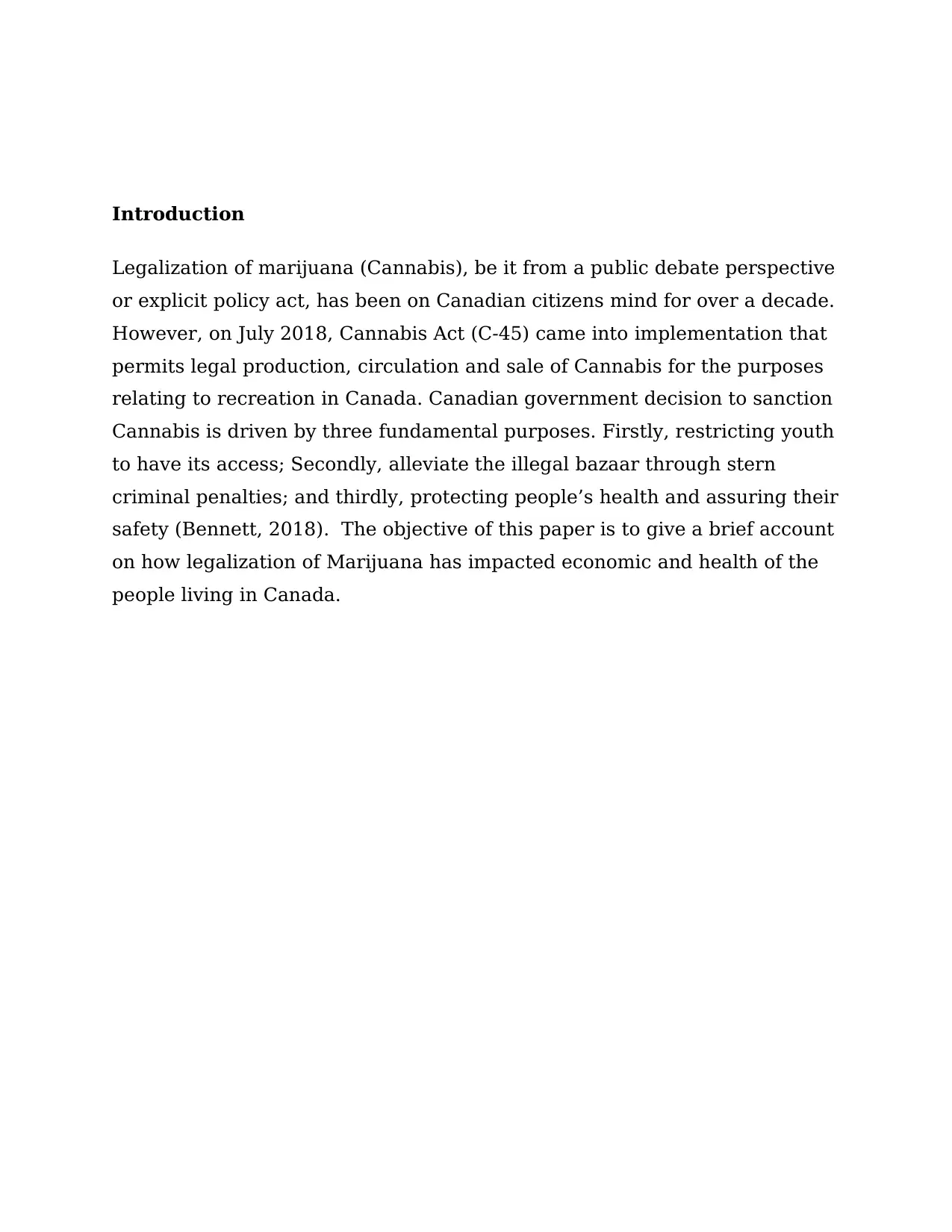
Introduction
Legalization of marijuana (Cannabis), be it from a public debate perspective
or explicit policy act, has been on Canadian citizens mind for over a decade.
However, on July 2018, Cannabis Act (C-45) came into implementation that
permits legal production, circulation and sale of Cannabis for the purposes
relating to recreation in Canada. Canadian government decision to sanction
Cannabis is driven by three fundamental purposes. Firstly, restricting youth
to have its access; Secondly, alleviate the illegal bazaar through stern
criminal penalties; and thirdly, protecting people’s health and assuring their
safety (Bennett, 2018). The objective of this paper is to give a brief account
on how legalization of Marijuana has impacted economic and health of the
people living in Canada.
Legalization of marijuana (Cannabis), be it from a public debate perspective
or explicit policy act, has been on Canadian citizens mind for over a decade.
However, on July 2018, Cannabis Act (C-45) came into implementation that
permits legal production, circulation and sale of Cannabis for the purposes
relating to recreation in Canada. Canadian government decision to sanction
Cannabis is driven by three fundamental purposes. Firstly, restricting youth
to have its access; Secondly, alleviate the illegal bazaar through stern
criminal penalties; and thirdly, protecting people’s health and assuring their
safety (Bennett, 2018). The objective of this paper is to give a brief account
on how legalization of Marijuana has impacted economic and health of the
people living in Canada.
⊘ This is a preview!⊘
Do you want full access?
Subscribe today to unlock all pages.

Trusted by 1+ million students worldwide
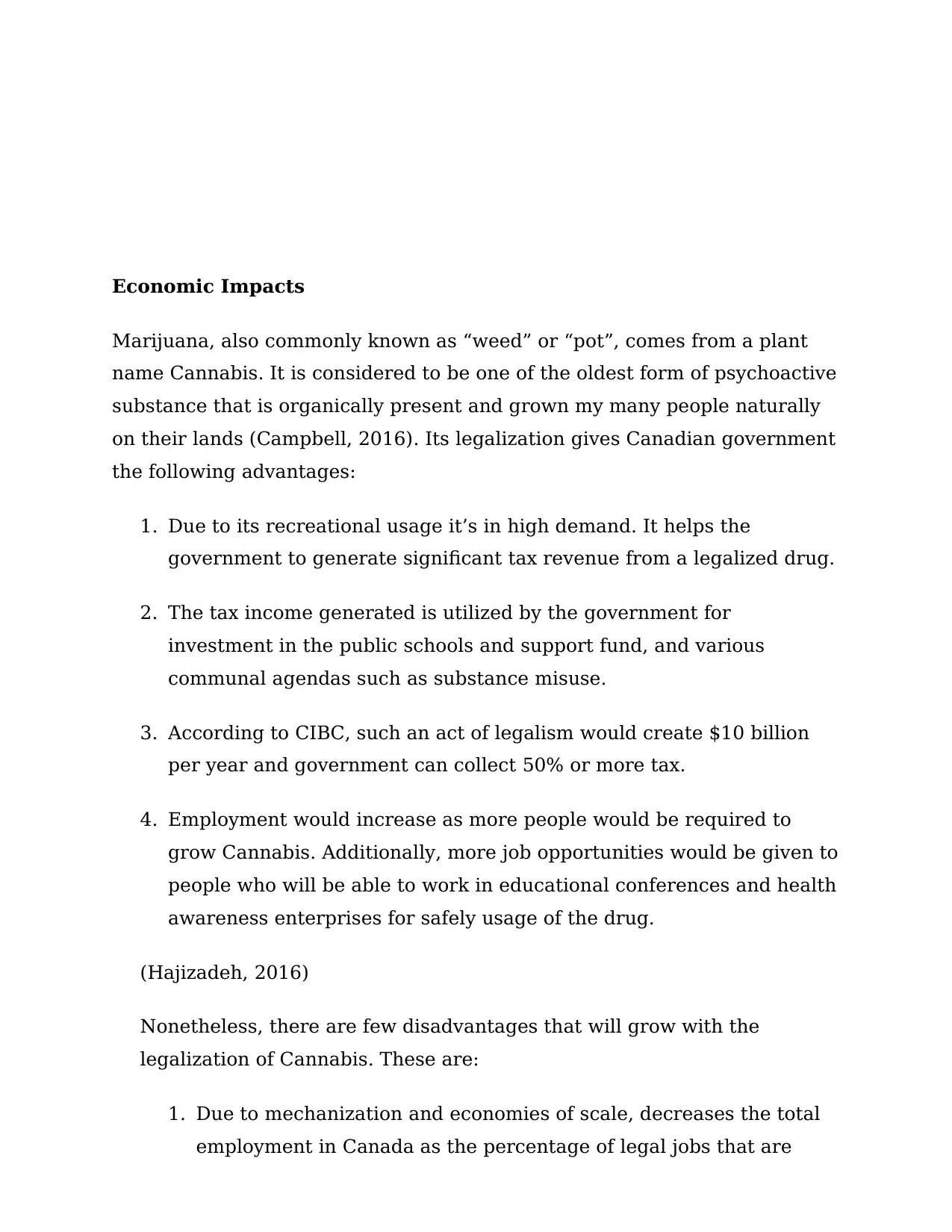
Economic Impacts
Marijuana, also commonly known as “weed” or “pot”, comes from a plant
name Cannabis. It is considered to be one of the oldest form of psychoactive
substance that is organically present and grown my many people naturally
on their lands (Campbell, 2016). Its legalization gives Canadian government
the following advantages:
1. Due to its recreational usage it’s in high demand. It helps the
government to generate significant tax revenue from a legalized drug.
2. The tax income generated is utilized by the government for
investment in the public schools and support fund, and various
communal agendas such as substance misuse.
3. According to CIBC, such an act of legalism would create $10 billion
per year and government can collect 50% or more tax.
4. Employment would increase as more people would be required to
grow Cannabis. Additionally, more job opportunities would be given to
people who will be able to work in educational conferences and health
awareness enterprises for safely usage of the drug.
(Hajizadeh, 2016)
Nonetheless, there are few disadvantages that will grow with the
legalization of Cannabis. These are:
1. Due to mechanization and economies of scale, decreases the total
employment in Canada as the percentage of legal jobs that are
Marijuana, also commonly known as “weed” or “pot”, comes from a plant
name Cannabis. It is considered to be one of the oldest form of psychoactive
substance that is organically present and grown my many people naturally
on their lands (Campbell, 2016). Its legalization gives Canadian government
the following advantages:
1. Due to its recreational usage it’s in high demand. It helps the
government to generate significant tax revenue from a legalized drug.
2. The tax income generated is utilized by the government for
investment in the public schools and support fund, and various
communal agendas such as substance misuse.
3. According to CIBC, such an act of legalism would create $10 billion
per year and government can collect 50% or more tax.
4. Employment would increase as more people would be required to
grow Cannabis. Additionally, more job opportunities would be given to
people who will be able to work in educational conferences and health
awareness enterprises for safely usage of the drug.
(Hajizadeh, 2016)
Nonetheless, there are few disadvantages that will grow with the
legalization of Cannabis. These are:
1. Due to mechanization and economies of scale, decreases the total
employment in Canada as the percentage of legal jobs that are
Paraphrase This Document
Need a fresh take? Get an instant paraphrase of this document with our AI Paraphraser
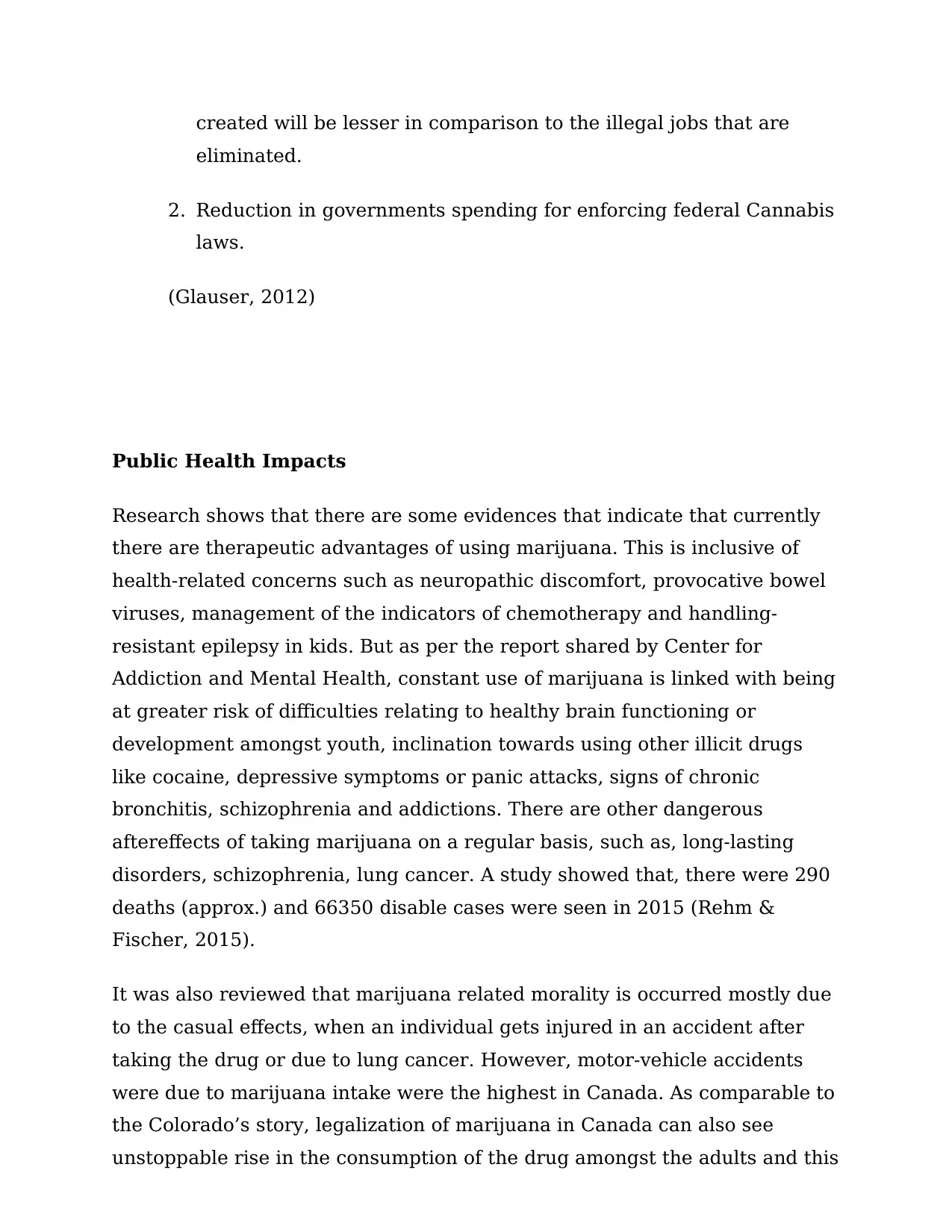
created will be lesser in comparison to the illegal jobs that are
eliminated.
2. Reduction in governments spending for enforcing federal Cannabis
laws.
(Glauser, 2012)
Public Health Impacts
Research shows that there are some evidences that indicate that currently
there are therapeutic advantages of using marijuana. This is inclusive of
health-related concerns such as neuropathic discomfort, provocative bowel
viruses, management of the indicators of chemotherapy and handling-
resistant epilepsy in kids. But as per the report shared by Center for
Addiction and Mental Health, constant use of marijuana is linked with being
at greater risk of difficulties relating to healthy brain functioning or
development amongst youth, inclination towards using other illicit drugs
like cocaine, depressive symptoms or panic attacks, signs of chronic
bronchitis, schizophrenia and addictions. There are other dangerous
aftereffects of taking marijuana on a regular basis, such as, long-lasting
disorders, schizophrenia, lung cancer. A study showed that, there were 290
deaths (approx.) and 66350 disable cases were seen in 2015 (Rehm &
Fischer, 2015).
It was also reviewed that marijuana related morality is occurred mostly due
to the casual effects, when an individual gets injured in an accident after
taking the drug or due to lung cancer. However, motor-vehicle accidents
were due to marijuana intake were the highest in Canada. As comparable to
the Colorado’s story, legalization of marijuana in Canada can also see
unstoppable rise in the consumption of the drug amongst the adults and this
eliminated.
2. Reduction in governments spending for enforcing federal Cannabis
laws.
(Glauser, 2012)
Public Health Impacts
Research shows that there are some evidences that indicate that currently
there are therapeutic advantages of using marijuana. This is inclusive of
health-related concerns such as neuropathic discomfort, provocative bowel
viruses, management of the indicators of chemotherapy and handling-
resistant epilepsy in kids. But as per the report shared by Center for
Addiction and Mental Health, constant use of marijuana is linked with being
at greater risk of difficulties relating to healthy brain functioning or
development amongst youth, inclination towards using other illicit drugs
like cocaine, depressive symptoms or panic attacks, signs of chronic
bronchitis, schizophrenia and addictions. There are other dangerous
aftereffects of taking marijuana on a regular basis, such as, long-lasting
disorders, schizophrenia, lung cancer. A study showed that, there were 290
deaths (approx.) and 66350 disable cases were seen in 2015 (Rehm &
Fischer, 2015).
It was also reviewed that marijuana related morality is occurred mostly due
to the casual effects, when an individual gets injured in an accident after
taking the drug or due to lung cancer. However, motor-vehicle accidents
were due to marijuana intake were the highest in Canada. As comparable to
the Colorado’s story, legalization of marijuana in Canada can also see
unstoppable rise in the consumption of the drug amongst the adults and this
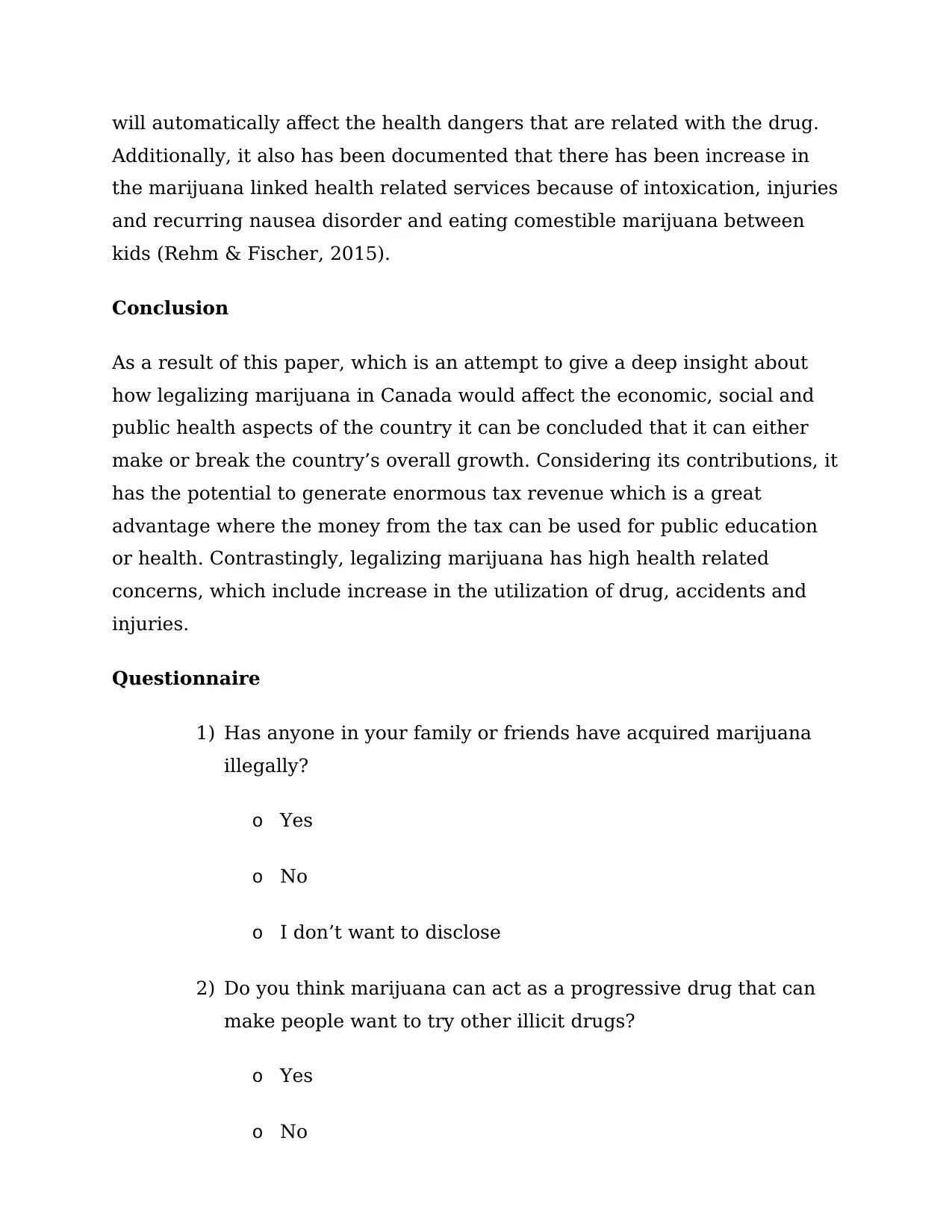
will automatically affect the health dangers that are related with the drug.
Additionally, it also has been documented that there has been increase in
the marijuana linked health related services because of intoxication, injuries
and recurring nausea disorder and eating comestible marijuana between
kids (Rehm & Fischer, 2015).
Conclusion
As a result of this paper, which is an attempt to give a deep insight about
how legalizing marijuana in Canada would affect the economic, social and
public health aspects of the country it can be concluded that it can either
make or break the country’s overall growth. Considering its contributions, it
has the potential to generate enormous tax revenue which is a great
advantage where the money from the tax can be used for public education
or health. Contrastingly, legalizing marijuana has high health related
concerns, which include increase in the utilization of drug, accidents and
injuries.
Questionnaire
1) Has anyone in your family or friends have acquired marijuana
illegally?
o Yes
o No
o I don’t want to disclose
2) Do you think marijuana can act as a progressive drug that can
make people want to try other illicit drugs?
o Yes
o No
Additionally, it also has been documented that there has been increase in
the marijuana linked health related services because of intoxication, injuries
and recurring nausea disorder and eating comestible marijuana between
kids (Rehm & Fischer, 2015).
Conclusion
As a result of this paper, which is an attempt to give a deep insight about
how legalizing marijuana in Canada would affect the economic, social and
public health aspects of the country it can be concluded that it can either
make or break the country’s overall growth. Considering its contributions, it
has the potential to generate enormous tax revenue which is a great
advantage where the money from the tax can be used for public education
or health. Contrastingly, legalizing marijuana has high health related
concerns, which include increase in the utilization of drug, accidents and
injuries.
Questionnaire
1) Has anyone in your family or friends have acquired marijuana
illegally?
o Yes
o No
o I don’t want to disclose
2) Do you think marijuana can act as a progressive drug that can
make people want to try other illicit drugs?
o Yes
o No
⊘ This is a preview!⊘
Do you want full access?
Subscribe today to unlock all pages.

Trusted by 1+ million students worldwide
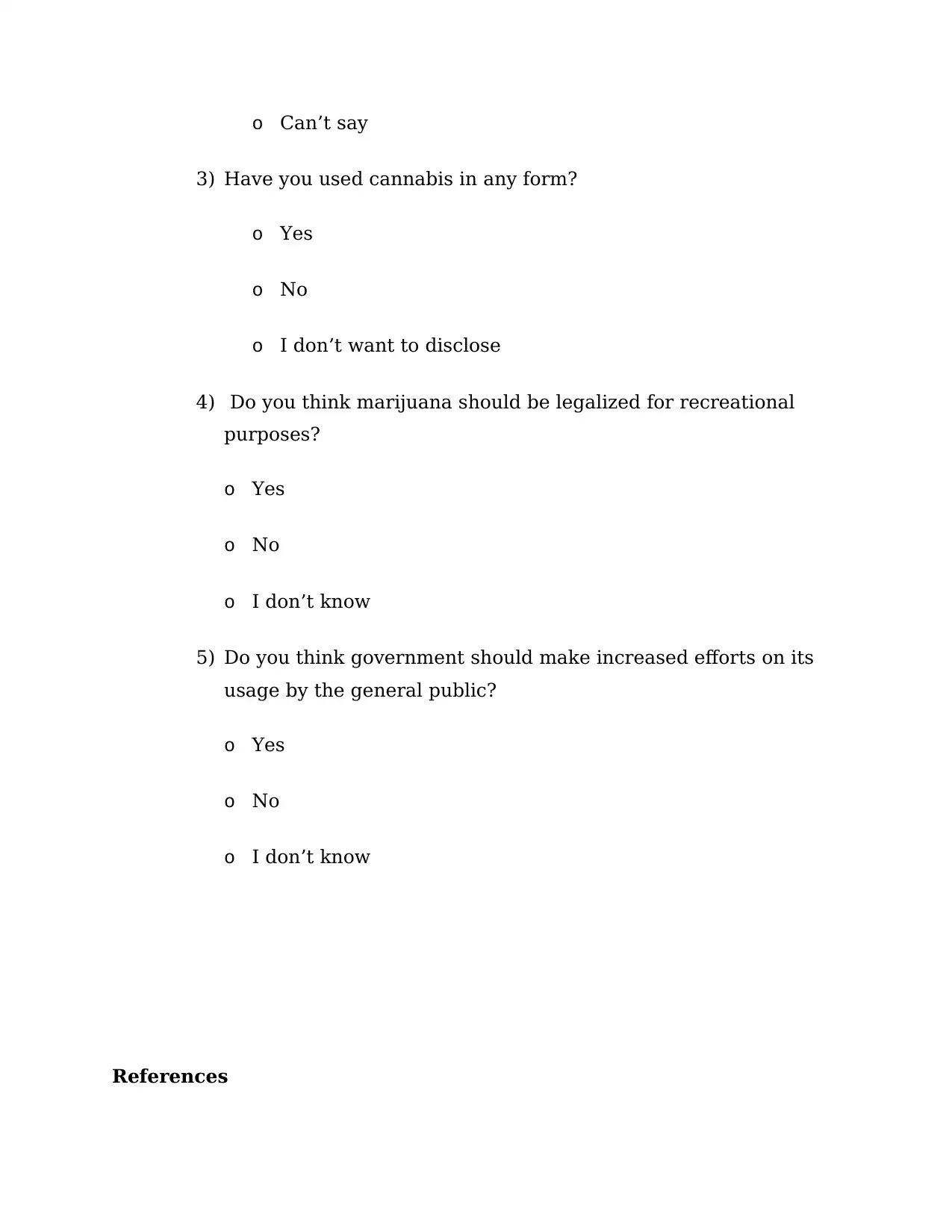
o Can’t say
3) Have you used cannabis in any form?
o Yes
o No
o I don’t want to disclose
4) Do you think marijuana should be legalized for recreational
purposes?
o Yes
o No
o I don’t know
5) Do you think government should make increased efforts on its
usage by the general public?
o Yes
o No
o I don’t know
References
3) Have you used cannabis in any form?
o Yes
o No
o I don’t want to disclose
4) Do you think marijuana should be legalized for recreational
purposes?
o Yes
o No
o I don’t know
5) Do you think government should make increased efforts on its
usage by the general public?
o Yes
o No
o I don’t know
References
Paraphrase This Document
Need a fresh take? Get an instant paraphrase of this document with our AI Paraphraser
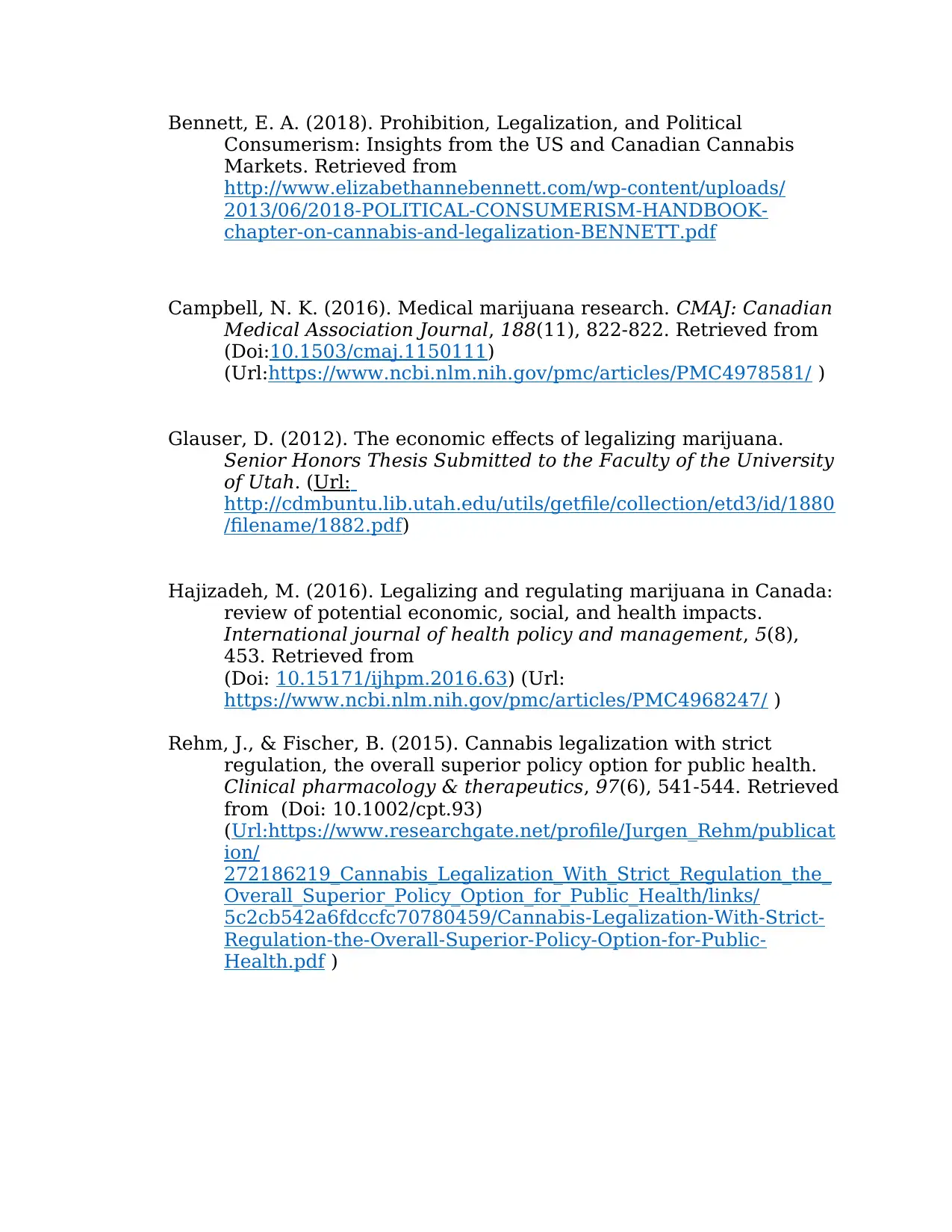
Bennett, E. A. (2018). Prohibition, Legalization, and Political
Consumerism: Insights from the US and Canadian Cannabis
Markets. Retrieved from
http://www.elizabethannebennett.com/wp-content/uploads/
2013/06/2018-POLITICAL-CONSUMERISM-HANDBOOK-
chapter-on-cannabis-and-legalization-BENNETT.pdf
Campbell, N. K. (2016). Medical marijuana research. CMAJ: Canadian
Medical Association Journal, 188(11), 822-822. Retrieved from
(Doi:10.1503/cmaj.1150111)
(Url:https://www.ncbi.nlm.nih.gov/pmc/articles/PMC4978581/ )
Glauser, D. (2012). The economic effects of legalizing marijuana.
Senior Honors Thesis Submitted to the Faculty of the University
of Utah. (Url:
http://cdmbuntu.lib.utah.edu/utils/getfile/collection/etd3/id/1880
/filename/1882.pdf)
Hajizadeh, M. (2016). Legalizing and regulating marijuana in Canada:
review of potential economic, social, and health impacts.
International journal of health policy and management, 5(8),
453. Retrieved from
(Doi: 10.15171/ijhpm.2016.63) (Url:
https://www.ncbi.nlm.nih.gov/pmc/articles/PMC4968247/ )
Rehm, J., & Fischer, B. (2015). Cannabis legalization with strict
regulation, the overall superior policy option for public health.
Clinical pharmacology & therapeutics, 97(6), 541-544. Retrieved
from (Doi: 10.1002/cpt.93)
(Url:https://www.researchgate.net/profile/Jurgen_Rehm/publicat
ion/
272186219_Cannabis_Legalization_With_Strict_Regulation_the_
Overall_Superior_Policy_Option_for_Public_Health/links/
5c2cb542a6fdccfc70780459/Cannabis-Legalization-With-Strict-
Regulation-the-Overall-Superior-Policy-Option-for-Public-
Health.pdf )
Consumerism: Insights from the US and Canadian Cannabis
Markets. Retrieved from
http://www.elizabethannebennett.com/wp-content/uploads/
2013/06/2018-POLITICAL-CONSUMERISM-HANDBOOK-
chapter-on-cannabis-and-legalization-BENNETT.pdf
Campbell, N. K. (2016). Medical marijuana research. CMAJ: Canadian
Medical Association Journal, 188(11), 822-822. Retrieved from
(Doi:10.1503/cmaj.1150111)
(Url:https://www.ncbi.nlm.nih.gov/pmc/articles/PMC4978581/ )
Glauser, D. (2012). The economic effects of legalizing marijuana.
Senior Honors Thesis Submitted to the Faculty of the University
of Utah. (Url:
http://cdmbuntu.lib.utah.edu/utils/getfile/collection/etd3/id/1880
/filename/1882.pdf)
Hajizadeh, M. (2016). Legalizing and regulating marijuana in Canada:
review of potential economic, social, and health impacts.
International journal of health policy and management, 5(8),
453. Retrieved from
(Doi: 10.15171/ijhpm.2016.63) (Url:
https://www.ncbi.nlm.nih.gov/pmc/articles/PMC4968247/ )
Rehm, J., & Fischer, B. (2015). Cannabis legalization with strict
regulation, the overall superior policy option for public health.
Clinical pharmacology & therapeutics, 97(6), 541-544. Retrieved
from (Doi: 10.1002/cpt.93)
(Url:https://www.researchgate.net/profile/Jurgen_Rehm/publicat
ion/
272186219_Cannabis_Legalization_With_Strict_Regulation_the_
Overall_Superior_Policy_Option_for_Public_Health/links/
5c2cb542a6fdccfc70780459/Cannabis-Legalization-With-Strict-
Regulation-the-Overall-Superior-Policy-Option-for-Public-
Health.pdf )
1 out of 8
Related Documents
Your All-in-One AI-Powered Toolkit for Academic Success.
+13062052269
info@desklib.com
Available 24*7 on WhatsApp / Email
![[object Object]](/_next/static/media/star-bottom.7253800d.svg)
Unlock your academic potential
Copyright © 2020–2026 A2Z Services. All Rights Reserved. Developed and managed by ZUCOL.




